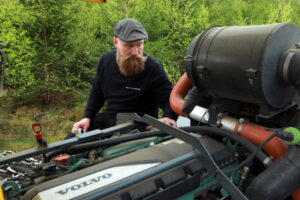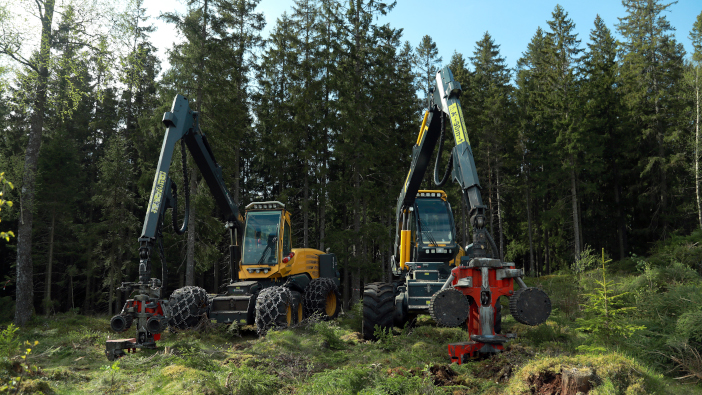A decade ago, Swedish manufacturer Eco Log worked with Volvo Penta to install engines into its product range. Now, the 1,000th Volta Penta D8 driven machine has been delivered.
The first Eco Log 580E machine to be powered by Volvo was delivered to forestry specialists Nitta Rundvirke AB. Now, the same company has ordered an Eco Log 590G with the latest D8 EU Stage V Volvo Penta engine.
Frans Spetz, co-owner of the forestry firm, conducts a variety of machinery field tests alongside the company’s transportation, excavation and forestry works.
“As field testers, we are honest and straightforward throughout the development process,” says Frans. “There are other field testers that are just happy to try something new, without giving proper feedback or telling the manufacturer what they think. But we always do.”
When forestry equipment malfunctions, it is often in a remote location and so the operator must have a detailed knowledge of the machine to solve issues on the spot.
Frans notes that despite working the machine to its maximum capacity, the D8 engine has remained reliable.
“We had to change the water pump at some point,” he says. “But that’s the kind of inevitable maintenance that comes from normal wear and tear.

“When you dimension everything correctly, and the engine is easy to work with, it just makes everything a lot easier,” Frans says, adding that one of the reasons many players in the forestry industry choose Eco Log’s machines is because they are equipped with Volvo Penta engines.
Soon after he ordered the 590G, Frans saw a video acknowledging that the 1,000th engine had been delivered. “There was a clip highlighting the occasion, showing Volvo Penta coworkers displaying an engine with a shiny, gold-coloured engine cover, which I thought looked really nice.”
It all came together when he went to collect the new harvester. “They had brought cake and stuff, and there – under the hood of my new harvester – was the engine with the golden cover.”
“The engines just keep going, meaning that we can keep going, too,” says Frans. “No repair needed, only occasional routine maintenance. It’s cool to know that the 1,000th engine sits right there, in our harvester. Not that we get that many opportunities to look at it, since it rarely ever needs to be checked.”


